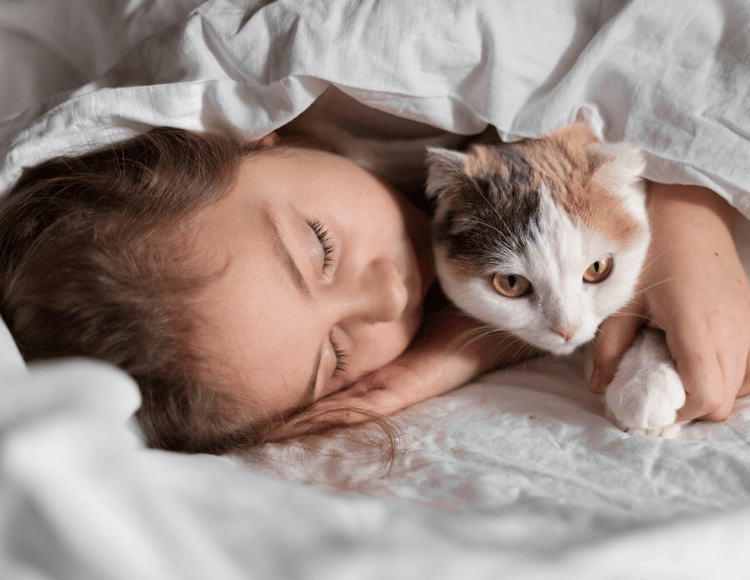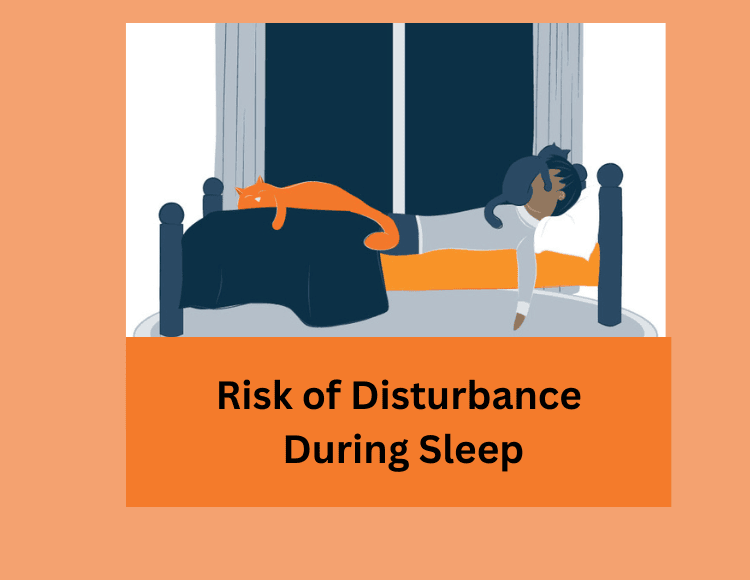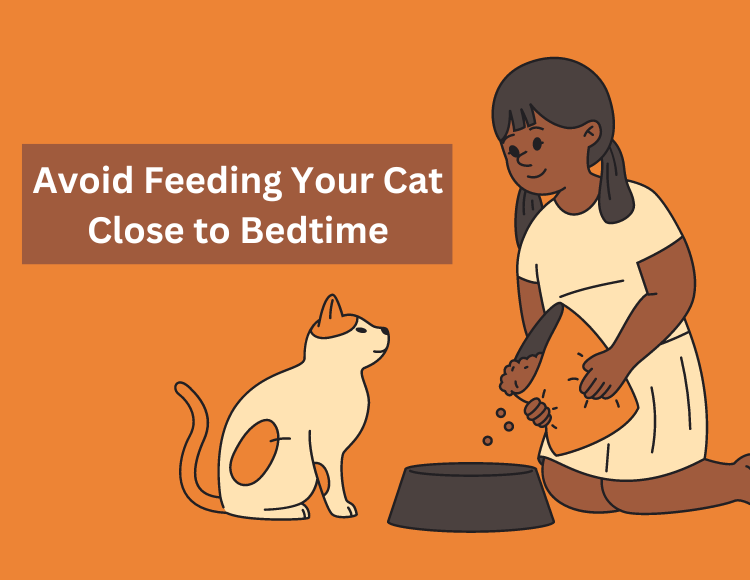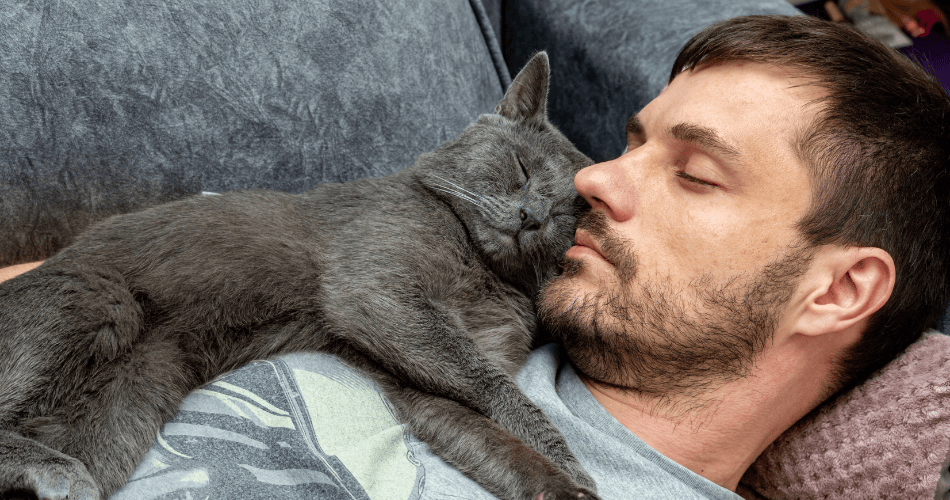If you have a feline friend, you might have noticed your beloved cat is sleeping above your head. But, why do cats do that? As a cat parent, you might be repeatedly dissecting the same question, “Why does my cat sleep above my head?” The good thing is we have the blessing to answer your query.
There are numerous reasons behind this cat behavior. Cats are very friendly and affectionate creatures and can make you engage with their non-verbal communication. If they have been seen sleeping above your head, it probably means they are trying to achieve safety and comfort or they just love you. But you don’t need to be worried as this is not considered weird and a lot of cat parents have already observed the same. In case you are not bothered by this cat habit and want to share an edge of your pillow then it’s just cool for all. However, your sleep might be hampered by this, so there are some courses of action to prevent this practice. To explore all your queries related to this, keep reading this article.
Why Your Cat Prefers Sleeping Above Your Head
Survival instinct is a feature of every living being and this instinct drives cats and other animals toward safety and comfort. Cats are no different from it. It might be one of the core reasons that made cats prefer sleeping above your head. Cats can sleep for up to 16 hours a day, and they often sleep in short bursts. They love to sleep in warm and cozy places and prefer to sleep in elevated areas, such as on top of a bookshelf, a windowsill, or your head. Still, if you are wondering, “Why do my cats always rub against me or sleep by the side of my pillow”, then you are in the right place. Here, we have enlisted some major reasons to explore this cat habit.
For Security and Safety
As we have mentioned earlier that every living thing including cats wants to survive more and like humans, they do want a safe and cozy harbor to spend their life. Here are two reasons to discuss.
Evolutionary Instinct
It’s not only humans who evolve through time. Cats are carnivorous mammals and have been domesticated over time. So far, they are treated as house cats. Like other living things, it is their evolutionary instinct to survive and seek safe shelter so that they can get a steady sleep with safety and security.
Feeling Protected
Cats are very social and playful animals and they seek protection and safety from their owners. Cat lovers don’t need to worry about why their cats always prefer to sleep above their heads. Rather you should make sure your precious cat is feeling protected or not.
Seeking Warmth
Cats love warm places. So, they seek a place with a heat source where they can take rest or sleep.
Temperature Preferences
One reason behind choosing to sleep over the owner’s head is that cats have hotter bodies than humans. Cat’s physical temperature varies between 100.5°F and 102.5°F (38.1°C and 39.2°C). If you rethink your cat’s preferences, you will find that your feline always takes rests in warmer places like your lap, beside a fireplace, or on a pillow. Human heads eject some body heat when they sleep and if your cat can not go under your cover, it is definitely your pillow side where she can find a warmer environment.
Using the Owner as a Heat Source
So just like the temperature preference, cats use their owner’s head as a heat source. Cats’ physical requirement of temperature drives them toward hot places. As your head is warm, so cats prefer to consider it cozy.
They Love the Way You Smell
Did you know that your cat may be attracted to the scent of your scalp? Your scalp is covered in sebaceous glands that secrete oils that your cat can detect with their keen sense of smell. This explains why your feline friend may show a strong interest in rubbing their mouth on your head – they are marking you with their scent.
Interestingly, the scent of any shampoos or hair products that you use may make your hair even more irresistible to your cat. This could also explain why your cat may be particularly drawn to your head after you’ve used certain hair products. But it’s not just hair products that can attract your cat to your head. Scents from face creams, lotions, and toothpaste can also be a reason why your cat may want to snuggle up to your head. So, if you find your cat constantly trying to nuzzle your head, it may be because they love the way you smell.
Your Head Stays Still
Cats are known for their love of sleep, and they are very particular about where they choose to rest. Your cat may have learned that when you are sleeping, you tend to move around a lot. This can interrupt their sleep.
Your head is a relatively stable and secure spot for them to rest without any flailing limbs to worry about. Cats are known to be experts at finding the most comfortable and safe place to rest their heads. So, the next time you find your feline friend curled up on your head, don’t be surprised. They may just be looking for a peaceful place to rest where they won’t be disturbed by your restless movements.
For Social Connection
Cats are social animals and they love to create bonding with others. Yes! They indeed have aggression and agility like other predators but so far, they have been explored as cute, adorable, friendly animals.
Bonding With the Owner
Cats love to create bonding and it’s one of the major reasons they tend to seek a place where their owner sleeps or takes a rest. Maybe your kitty is sleeping above your head because it holds a strong bonding with you.
Seeking Comfort and Reassurance
Still, if you are searching for meaning why does my cat sleep above my head then, you may consider that she is seeking a cozy and warm environment for his comfort and she wants reassurance that you do love and care for her.
They Just Love You
If you’re a cat lover, you may have noticed that your feline friend has unique ways of showing affection. Cats often mix their scent with yours to mark their territory, knead you, and groom you from time to time. But did you know that when cats sleep by your head, it’s also a way for them to show affection? In fact, when cats sleep with you, it’s a sign of trust. Wild cats often sleep where they feel safest, so if your cat chooses to sleep by your side or on your head, it’s likely because they feel secure and protected around you.
How Can You Tell If a Cat Has Imprinted on You?
Imprinting is a process where a kitten forms a strong bond with another animal or human during the early stages of development. If you have a cat and you’re wondering if they have imprinted on you, here are some signs to look out for:
Following You Around
Cats that have imprinted on their owners will often follow them around the house and want to be near them.
Seeking Physical Contact
Cats that have imprinted on their owners will seek out physical contact, such as snuggling, sitting on laps, or rubbing against their owners.
Vocalizing
Cats that have imprinted on their owners may be more vocal, meowing or purring to get attention or express their affection.
Showing Preference
Cats that have imprinted on their owners will show a preference for them over other people or animals.
Relaxing In Your Presence
Cats that have imprinted on their owners will be more relaxed and at ease when they are near them.
The Benefits of Allowing Cats to Sleep Above Our Heads
Cats have been our beloved furry companions for thousands of years, providing us with endless affection, entertainment, and even some health benefits. One particular benefit of having a feline friend is allowing them to sleep above our heads. More than 50% of cat parents allow their cats to share a bed. It is not only a sweet and comforting bonding experience but also has several benefits. Here, we have enlisted 7 benefits of sharing a bed with your adorable cat.
Reduce Stress and Anxiety
Having a warm and purring kitty on top of us can help reduce stress and anxiety levels. The rhythmic sound of a cat’s purr has been known to have a calming effect, leading to a more relaxed state of mind and a better night’s sleep.
Enhance Feelings of Security
Cats are known for their keen senses and their ability to detect danger. When sleeping above our heads, cats can act as protectors and provide us an enhanced sense of security.
Improve Sleep Quality
Sleeping with a cat above our heads can promote better sleep quality. The gentle weight and warmth of the cat can create a sense of comfort and coziness that can lull us into a deep and restful sleep.

The Therapeutic Effects of Petting and Cuddling
Another benefit of allowing your cat to sleep above your head is the therapeutic effects of petting and cuddling. Petting and cuddling our furry friends have been shown to have numerous mental and physical health benefits, including reducing stress, lowering blood pressure, and increasing feelings of happiness and well-being. When our cats sleep above our heads, it creates the perfect opportunity for some extra cuddles and pets, providing us with the therapeutic benefits of physical touch and connection with our furry companions. It’s a win-win situation for both humans and cats, as it strengthens our bond and promotes our overall health and happiness.
Strengthen the Bond with Your Cat
Allowing your cat to sleep above your head can strengthen the bond between you and your feline friend. Close physical contact and shared space can lead to a stronger emotional connection and a deeper sense of trust.
Reduce Allergies and Asthma
Believe it or not, sleeping with a cat above our heads can actually reduce allergies and asthma symptoms. Studies have shown that exposure to allergens such as cat hair and dander at a young age can help build immunity and reduce the risk of developing allergies and asthma later in life.
Boost Your Mood
Lastly, sleeping with a cat above our heads can simply make us happy! The mere presence of our feline friends can boost our mood and provide us with a sense of companionship and comfort.
The Potential Drawbacks of Cats Sleeping Above Our Heads
Cats are amazing creatures that can bring joy, comfort, and companionship to our lives. They’re soft, cuddly, and often hilarious, making them perfect sleep partners. However, sleeping with your cat might seem like a great idea, but before you accomplish that you should consider the potential drawbacks that could impact your sleep quality, health, and relationships. Here, we have enlisted 5 downsides of cats sleeping above our heads.
Risk of Disturbance During Sleep
Cats are nocturnal animals, which means they’re most active at night. While you might enjoy having your cat curled up beside you in bed, they might have other plans. Your cat might start meowing, purring, or grooming themselves, which can be very distracting and wake you up. They might also jump on and off the bed, walk around, or play with toys, which can make it difficult for you to fall asleep or stay asleep. If you’re a light sleeper, this could be a major problem and could lead to sleep deprivation, fatigue, and irritability.

Allergic Reactions and Respiratory Problems
If you have allergies or respiratory problems, sleeping with your cat might not be the best idea. Cats can produce dander, which is a common allergen that can trigger sneezing, coughing, and itching. They can also carry pollen, dust, and other allergens from outside, which can exacerbate your symptoms. In addition, if you have asthma, sleeping with your cat might make it harder for you to breathe and could lead to wheezing and shortness of breath.
Maintaining Boundaries and Respect
Cats are free-spirited animals. They like to have their own space and boundaries. While they might enjoy cuddling with you in bed, they also need to feel safe and secure. If you invade their personal space, they might become anxious or agitated, which could lead to behavioral problems. It’s important to respect your cat’s boundaries and give them a comfortable space to sleep, whether it’s on the bed, on a nearby chair, or in their own bed.
You Just Like to Sleep Alone
Sometimes it might be hard for you to sleep with someone or if you prefer to sleep alone, sleeping with your cat might not be the best idea. Your cat might take up too much space, hog the covers, or interfere with your privacy.

When You Have a Partner
If you’re in a relationship, your partner might also have allergies, be allergic to cats, or simply not like sharing the bed with them. It’s important to consider your partner’s feelings and find a compromise that works for everyone.
To conclude, if you do choose to sleep with your cat, make sure they’re comfortable, clean, and healthy and that you respect their boundaries and needs. And if you’re having trouble sleeping or experiencing health problems, it might be time to reconsider your sleeping arrangements and find a solution that works for everyone.

How to Prevent Your Cat from Sleeping Above Your Head
The most ideal way to keep your cat off the bed is to shut the bedroom door while you sleep. Cats are known for their love of snuggling up close to their owners, especially when it’s time for bed. Their natural instincts tell them to seek comfort and safety near their trusted human companion. However, sometimes your cat’s desire to be close to you can become a bit too overwhelming. You may find yourself struggling to get a good night’s sleep with your feline friend perched on top of your head. If this is the case, don’t worry, there are ways to prevent this without hurting your kitty’s feelings. In this section, we have enlisted 6 ways to prevent your cat from sleeping above your head.
Provide a Cozy Bed
Cats love to have a cozy and comfortable place to sleep. Provide them with a soft and comfortable bed that is placed in a quiet area away from your bedroom. By giving your cat their own space, they will be less likely to disturb your sleep.
Close the Bedroom Door
If your cat is still insistent on sleeping on your head, consider closing your bedroom door. This may take some getting used to for your furry friend, but over time they will learn that the bedroom is off-limits. Remember to provide them with their own cozy sleeping spot in another area of the house.
Use Positive Reinforcement
Training your cat to sleep in its own bed requires patience and consistency. You can use positive reinforcement techniques to encourage your cat to sleep in their own bed. Reward them with delicious treats or praise, when they choose to sleep in their bed instead of on your head. We advise remembering that rewards may vary between cats.
Avoid Feeding Your Cat Close to Bedtime
Feeding your cat before bed can cause them to become restless and more likely to climb on top of your head. Instead, try to feed your cat a few hours before bedtime. This will give them enough time to digest their food and settle down for the night.

Give Your Used Cloth with Your Scent
Cats are comforted by their owner’s scent. Try giving your cat a piece of your used clothing, like a t-shirt or sweater, to sleep on. This will help your cat feel close to you, without actually being on top of your head.
Train Your Cat to Stay Off Your Head
You can teach your cat to stay off your head. This can be done by gently nudging them off when they climb up, using a spray bottle filled with water to deter them, or by teaching them the “off” command. With patience and consistency, your cat will learn to sleep in their own bed.
Taking everything into account, with a little patience and training, you can prevent your cat from sleeping above your head. By providing them with a cozy bed, closing the bedroom door, using positive reinforcement, avoiding feeding your cat close to bedtime, giving your used cloth with your scent, and training them to stay off your head, you and your furry friend can sleep quietly and comfortably through the night.
In a Nutshell
Cats sleep above their owners’ heads for several reasons, including seeking safety and comfort, warmth, and bonding with their owners. Cats’ preference for elevated, warm places and their evolutionary instinct to find a safe harbor also play a role. Additionally, cats love the way their owners smell, and they may take a rest on their owners’ heads because they stay still and offer a secure spot. Though this behavior is not uncommon, if it disrupts your sleep, you can take measures to prevent it by providing them with a cozy bed, closing the bedroom door, using positive reinforcement, giving your used cloth with your scent, and training them to stay off your head.

